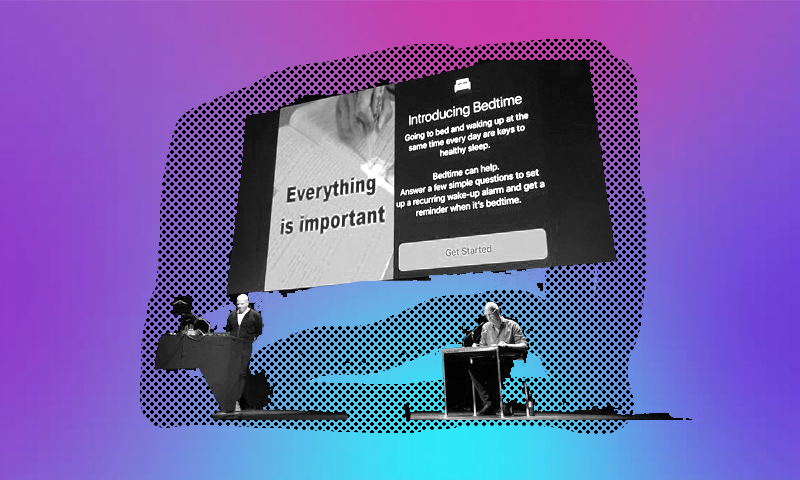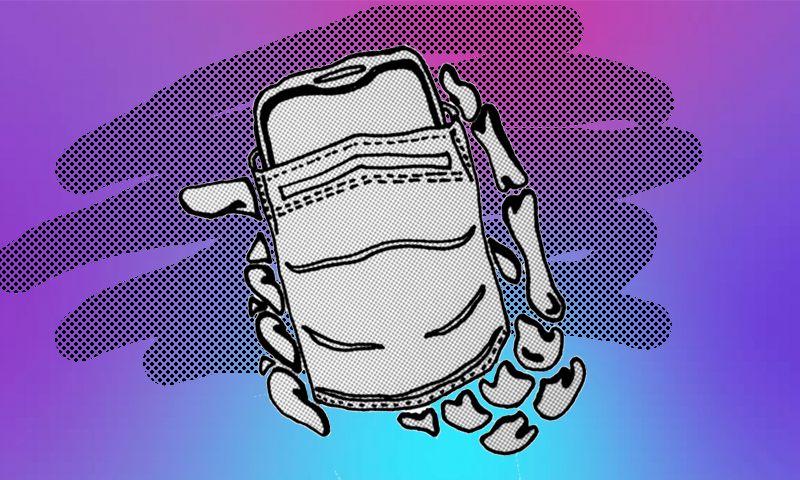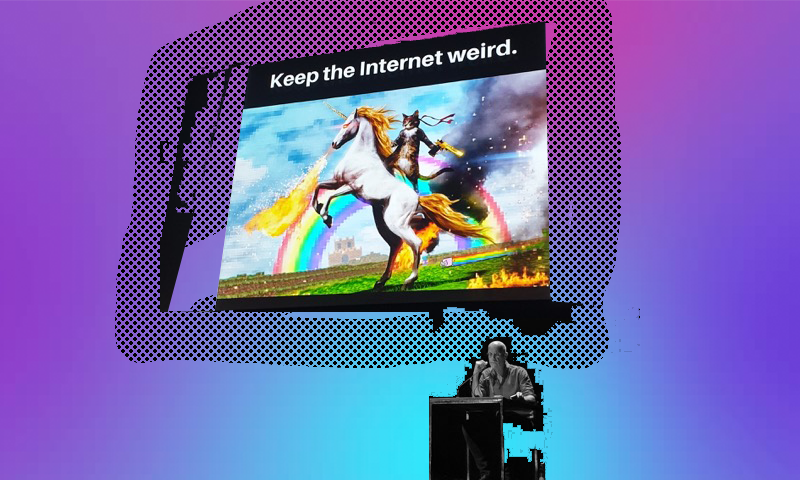Offline Matters: An Interview Series is co-presented with No Fun Mag, a membership newsletter by Jess Henderson, author of the book Offline Matters: The Less-Digital Guide to Creative Work.
In our third interview of this series, Jess speaks with Dutch media theorist, Internet critic and author Geert Lovink. His books include Uncanny Networks, Dark Fiber, My First Recession, Zero Comments, Networks Without a Cause, Social Media Abyss, Organisation after Social Media (2018, co-authored with Ned Rossiter) and Sad by Design.
Together, they discuss offline possibility spaces and the need to rekindle a culture of refusal to participate in the systems that be.

Geert Lovink. Source: Wikimedia Commons.
Dear Geert,
As I write to you, you are on vacation in a depopulated rural area and pretty much offline for the majority of the day. The limited internet access you have there must mutate your regular relationship to being online, one I can only imagine is far less intensive than your usual every day in Amsterdam.
Can you explain about how your experience of increased time offline goes there—how do you ‘structure’ it and how does it feel? Do the sensations change over the weeks spent in this setting?
Geert Lovink: I am on a weak 3G signal, via mobile phone connected to the laptop, a connection that doesn’t work most of the time. I am online once or twice a day to download email and do a quick round of my news sites—until the signal breaks. Being offline for me means slowing down the body, clearing one’s mind, being able to read a book and write. Being able to think and focus on what’s to be done.
During the year, in the office and on the road, I am often restless and want to initiate stuff. I am neither a news junkie nor a social media addict, so that’s something, but my overall state of mind can be pretty all over the place, for activist reasons. This makes it harder to concentrate on difficult texts. Though I find it is not an obstacle for writing.
There is this basic nervousness in me, which was also there before I got my own access to the internet in 1993. Knowing this, I have taken good holiday breaks throughout my life to recover and regain the energy to keep going.

We have both described offline as a ‘possibility space’. Could you explain your reading of this and tell us how you utilise your offline possibility space?
In my role as theorist, critic, activist and organizer, it is important to be able to bring the new things into the world, otherwise we’re merely reacting.
We do not just respond to, participate in, or interact with ‘their’ systems. We do this way too much and in that sense recreate a culture of refusal in order to create more space, energy, and freedom to experiment with the possibility spaces that we desire and want to put into the world.
“When we design, build, and use ‘possibility spaces’ we make a claim for a different future.”
— Geert Lovink
Most of the time these remain concepts, ideas, memes, dreams. There is nothing wrong with that.
As Bernard Stiegler, who recently passed away, used to say, ‘to regain the ability to dream is a revolutionary act of resistance’. In order to get there, we need to literally reclaim our ability to dream at night—and remember them when we wake up.
To put an imaginary collective practice out into the world can be very powerful: dream first, build later.

Events will reveal themselves when the time has come for a ‘crystal’, something glistening with potential amongst the rubble, to be turned into a mass movement.
I am in favour of first growing basic infrastructure, slow and steady, before action is unleashed. Some alternatives remain marginal, turn into reformist programmes, or worse, are hijacked by greedy start-up types that will make millions from your subversive proposition.
Or, they will be instrumental in tackling an authoritarian regime. Who knows. Let history be the judge.
In my experience we cannot deconstruct in advance.
A century ago this gift, or capacity to create something entire new and shocking, was attributed to avantgarde artists, literary figures, and certain political actors.
But they lost the vision to anticipate the coming (with the exception of the alt-right intelligentsia who perhaps describe the current moment in a clearer way in comparison to the PC liberal globalists that refuse to see recent geo-political constellations.)
I do not think that offline should be seen as a goal in itself. We will overcome the current compulsive behaviours.
One day having internet will be something like access to electricity and water, which is special anyway and rare for most of us on this planet, meaning that it will be rare.
It will not the be the speed that matters so much as access an such.
The fight over global infrastructure is stepping up. It will be considered rare to access other cultures, just as it was in the past. You will be able to talk to your fridge but who cares, compared to the one-off (video) dialogues with friends in Sydney, Shanghai, Kampala, and Delhi.

We do not need more socially engaged and digitally aware farmers, engineers, lawyers or nurses. We’re not talking about ‘Bildung’ (Ed note: the German word for ‘education’ or ‘formation’, referring to the German tradition of self-cultivation, wherein philosophy and education are linked in a manner that refers to a process of both personal and cultural maturation) or some educated attitude anyway, let alone a change in the discourse (let’s fight politically correct newspeak as it is Enemy No.1 of anyone who wants to bring on change).
Change will be structural and will go deep into institutional reality. Language corrections are cosmetic and in fact create obstacles to real change. Education, housing, the job market, payment systems, energy production; they need to be changed. And yes, the social media architectures as well, but I do overestimate the importance of the (social) media question.
Does that mean we are perhaps also overestimating the sense of urgency in our mediation of time spent on and offline?
I would not use the word urgency in this context. Racism, climate exchange, poverty, and sexism are urgent. In other words, these are deep and structural technological violences, as our German comrades call them.
As a nihilist I can also be hopeful, namely that mankind will simply forget the internet, once it is embedded and grounded into the everyday. At the moment, captured by a permanent state of disruption, this is not the case.
“How do we liberate ourselves from the digital chains so that we can pay attention to other things? For me, the emphasis on individual solutions, therapy, and the change of behaviour is the main obstacle to overcome the smartphone.”
As we know by now, the corona crisis has pulled us even further into what’s called the ‘simulacrum’ (a sort of poor diluted substitute/representation of the real thing or person – coming from a Latin verb meaning “to copy, represent, or feign.”)
“What we need is a Covid-19 lockdown moment for everything digital. A disruptive shock that makes us forget all these accounts, status updates, pet videos, pseudo friends and followers.”
We have not woken up. Instead, we’re hiding even further, going deeper and deeper down into the online abyss.
All our research and debates around tech-induced burn outs, depression, distraction, and the unlearning of vital human skills will have to be stepped up. We’re nowhere near that.

The experience of feeling ‘overwhelmed’ by time spent online and the deepening integration of digital media into our lives is common.
Your work deals with the emotional affects of sadness, depression and despair – which are by no means an undesigned consequence. Can you explain some of the causes of ‘overwhelm’ and its most insidious (or positive?) knock-on effects?
What overwhelms young people is the task to establish a (professional) life. Where to start? The lack of overview and the information overload create a feeling of constant panic. So much to read, so much to know. How do I enter networks and build one myself? Where do I fit in? What can I contribute?
In many societies, one’s professional fate is decided by the tribe, the family. However, one is increasingly thrown back into ‘How can I develop my own voice and niche from where I can operate’? Is there something like an individual signature? Perhaps not, but I do believe in skills, in small steps, working on various projects at the same time with clear deadlines, and moral support from friends and outsiders.
Some will insist to use apps. Whatever. What we need are solidarity networks to end the neo-liberal cult of competition.
“I do believe in skills, in small steps, working on various projects at the same time with clear deadlines, and moral support from friends and outsiders.
Some will insist to use apps. Whatever. What we need are solidarity networks to end the neo-liberal cult of competition.”
If there are some key messages of significance to today’s creative worker, what would you say?
Get organized. Scale up together, create unions and co-ops.
I know there is the risk of middle management, creating old, new bosses and boring structures, but the neo-liberal precarious road really is a dead end street for most of us (I too have been in that position, for far too long).
Some will do this for protection reasons, others out of solidarity, out of passion and fun to break out of that virtual cage of loneliness and despair. With this comes a revolution of the workplace architecture.
The WeWork sharing economy model is dead. So is the cubicle. The open-work planned offices should be closed overnight. If they want, give workers their own dedicated space (the idea that everyone will work from home is ludicrous and oppressive, especially for parents with children at home.)
“We need a combination of a quiet cell and the lively social space where we come together.”
But most of all, we need new forms of digital money that are embedded in fair revenue models. Creative work will need to be paid properly.
This also involves radical tax reform and redistribution of wealth, period. Automated crypto-payments and tokens alone will not do the job.
In the current system the real money is, by definition, always made elsewhere, by others. By closing the extractive industries, we will certainly make a radical gesture: close Hollywood, Facebook, big galleries, large publishers. But this can also be a start, leading to
solutions that lie elsewhere.

As the boundaries blur further between our on-and offline lives, the differentiation becomes undefinable for many, as you mentioned in the quick shift to working from home en masse.
Which acts of resistance become necessary, particularly in relation to work? And if resistance is not the right word, is there a more radical action necessary?
I am betting on structural solutions, not accidental improvements of labour laws, no matter how attractive they may seem (like free healthcare, a centralized pension system, better contracts).
It is not a matter of collective bargaining. I do not believe in the ‘art strike’. What’s more useful is to occupy their offices. The arts sector is now shrinking at a radical pace. I wonder what will be left after this ‘stack’ of crises.
Likely the arts will, again, be a small, exclusive domain of the rich (as it used to). Right now, we have this precarious class that has been mass produced at Goldsmiths and related art schools, young kids without skills, trained in all the post-colonial and gender theories. Will Black Lives Matter provide them with jobs? I have doubts.
What’s left for them to politicize is their own precariousness. Will they be able to pull themselves out of the mud?
As you see, when we’re talking about resistance we need to get away from identity politics and open ourselves up in a most radical way. It is about compassion, not self-pity.
“To create interdisciplinary, meta-weird, intergenerational networks beyond the well-known platforms–real and futuristic ones, of artists, activists, and other irregulars.”
To all the young writers, researchers, activists, artists, and users, what is our mission and its goal as it stands today in the context of the pandemic, and beyond?
In this way we can exchange ideas and experiences, critiques and strategies beyond the ‘news’, and build strong ties, organisations, and counter-institutions.
At the moment we’re dictated by Events—large, planetary ones, and there will be more of them to come. If we do not merely want to respond (and ‘share’ the fate of others, including ourselves), we need to take the lead and become avantgarde. There is no shame in that.
We need to take the lead—in listening and anticipating. We have deconstructed what went wrong in past decades and centuries enough. We know that there are alternatives.
Philosophy, theory and criticism will take the lead (I am not saying academics, as I do not expect much from them, stuck in their closed peer-review article universe, obsessed with ranking).
Thinking is alive and well and let’s be inspired by all the amazing insights, theories, and wisdom that is out there. We will build schools and teach ‘the spirit of non-submission’ (Stiegler).
Sadly, this will happen outside of universities (but that’s been the case for a long time). We can be inspired by the working-class self-education that ran schools for decades up until the second world war.
The good news is that we have amazing tools at hand, and marvellous trainers. The irony of today is that we no longer have our spaces in which to gather. This is why the resurrection of the squatters’ movements in large cities is of the upmost urgency.
Temporary Autonomous Zones are not some identity circus ground for forgotten countercultures. The organisation and maintenance of our own virtual and real spaces is pivotal.
The lockdown may have been good for some to open up a space for contemplation and bring the Machine to a halt, but I am wary to promote loneliness. Organized sadness needs to be toppled.
“We can reclaim the streets but in order for movements to maintain themselves, reflect and mature, they need their own cafés, theatres, schools, workshops, and spaces.”
Now, this is all easy to arrange and not some insurmountable task. Take back the city. Self-organisation needs room and space for debate, culture and conspiracy—the right one, that is, ours.




























